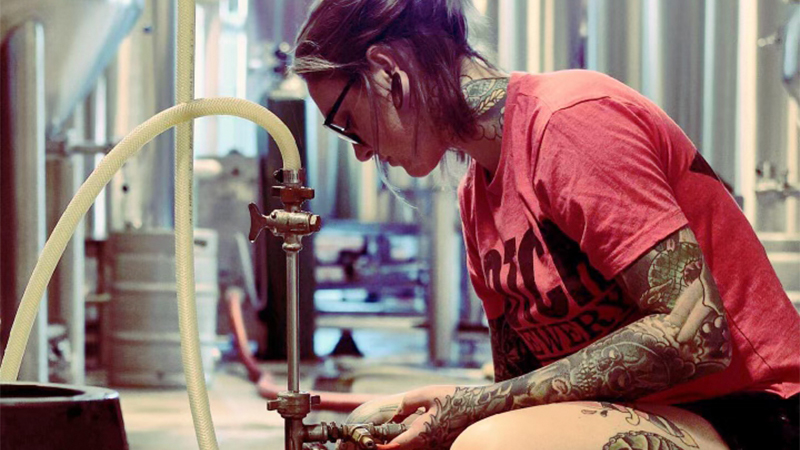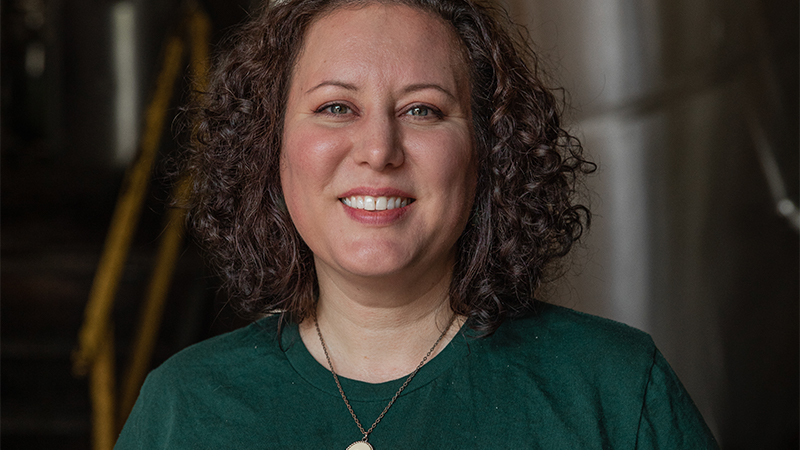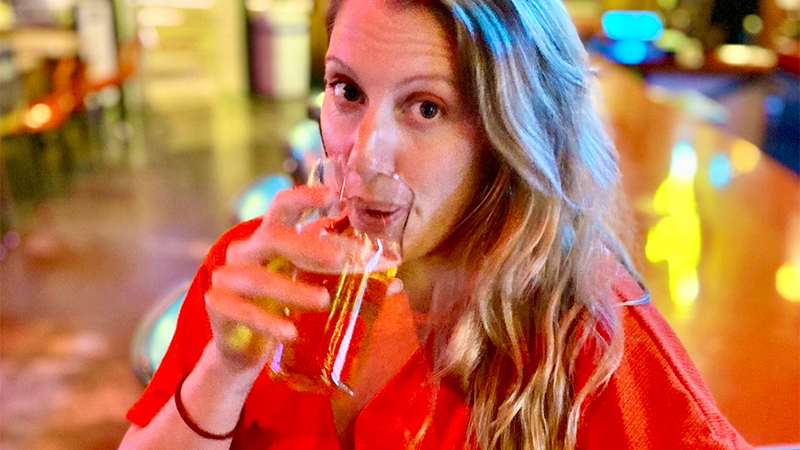On May 11, 2021, Brienne Allan, a production manager at Notch Brewing in Salem, Mass., asked women in beer about their experiences with sexism, launching a tidal wave of accounts detailing everything from insidious behavior to full-on sexual assault. For months, craft beer professionals, consumers, and anyone else paying attention have watched these stories reveal a discriminatory, inequitable, unsafe face of the craft beer industry that is not surprising but horrifying all the same.
The need for change is urgent. Local guilds, breweries, and even individuals are tirelessly creating resources and mapping roads forward to a better industry that not only guarantees safety but actively welcomes women, LGBTQIA+ and non-binary people. After bearing the mental and emotional weight of processing and sharing thousands of these stories and even receiving legal threats, it would be understandable if Allan chose to pass the torch — she has catalyzed a revolution, after all. But the brewer isn’t slowing down; instead, Allan has organized a movement for any and all breweries to join, and it fittingly revolves around beer.
Brave Noise is a collaborative brew, à la All Together, Black is Beautiful, and People Power. There is a cause, a recipe, branding, and set steps to participate, including donating proceeds to a related organization. Developed to make a big impact and soon, Brave Noise stands apart with its call to action.
Allan says the project was named for a beer she brewed with Notch teammate Juleidy Peña Mejia. After Brave Noise Pale Ale debuted in June to honor the movement, breweries reached out asking if they could help or access the recipe to make Brave Noise where they were. Then, Allan heard from Stout Collective, a creative studio that worked on All Together, as well as Ash Eliot, founder of Women of the Bevolution, a platform providing resources, networking, and a safe space for women in the alcohol industry. Together, they attached the Brave Noise Pale Ale to a tangible mission.
“We created a plan to not only make the beer’s statement public, but hold breweries accountable when they brewed it,” Allan says. “No more whitewashing on causes; we need direct action.”
Before breweries even get to the recipe, they must submit their codes of conduct. That means creating one in the first place, which some smaller breweries may not have already done. Then comes brewing the pale ale and, upon its release, breweries must publish that code of conduct for staff and customers alike. A portion of the beer’s proceeds must be donated to an organization that supports Brave Noise’s mission; Allan and her team provide a list of suggestions. Finally, breweries must commit to working toward long-term safety and inclusion for both employees and patrons. Brave Noise has a deadline of December 2021 for participation, intended to, as Allan puts it, “make the loudest noise possible.”
These steps work toward avoiding a potential pitfall of past industry-wide collaborations, where breweries may have participated only to keep up appearances. The only way to join Brave Noise is to do real work in your company.
“We looked at other collabs and also thought about what was missing at breweries: transparency,” Allan says. “By asking for a code of conduct and for it to be displayed publicly, we felt this was one way for staff and consumers to hold companies accountable.”
Brave Noise, Allan continues, gives breweries a toolbox to grow their own roles in a safer beer industry, and it also gives both workers and consumers a way to gauge how effectively breweries are creating and maintaining a discrimination-free environment.
“I think collabs are great for awareness but what comes after, right?” Eliot says. “I’m real tired of businesses showing face but not showing up. We need action. We need accountability. Brave Noise is not a shield; [it’s] meant to get everyone thinking about how they can do better and take the necessary steps to get there.”

Call and Response
Eliot says breweries joining the collaboration have been a steady trickle rather than a rush, but that’s not necessarily a bad thing. It means breweries are doing the work this collaboration requires and that the industry desperately needs. In some cases, breweries might not already have a code of conduct or might have one but it feels outdated, so that needs serious attention first before any beer gets brewed.
“I like that [this] has sparked a conversation about the policies and resources they need to put in place that they maybe didn’t have time to address prior,” Eliot says. “But we need every brewery and beer-related business globally addressing what has been happening in the industry.”
Pilot Project Brewing in Chicago; Trillium Brewing in Canton and Boston, Mass.; and Saint Archer Brewing in San Diego are just a few of the breweries that have joined Brave Noise.
Co-founder and CEO of Pilot Project Dan Abel worked in the music industry before beer, so unfortunately, little felt new about this current reckoning, he says. “Brienne is opening doors for action, healing, and a message that will continue to permeate around the world and across other industries,” Abel says. “There is no place in this business for those who do not support and amplify that message.” His brewery, he explains, advocates for creativity and lower barriers of entry, so it was essential for Pilot Project to make sure it was actively contributing to a more equitable industry.
Pilot Project had zero-tolerance policies in place from day one, Abel adds, but recent events made the team realize their efforts had been limited to their own business and that of their partners. Now, they’re thinking about the big picture and how they can help disrupt the entire beer business. In addition to building on current policies and partnering with other breweries to launch three women-owned businesses in the last two years, Abel says Pilot Project is now highlighting and reiterating its messaging and ally status.
“We cannot tokenize the message by showing the occasional woman in a position of influence, but rather represent our entire team as advocates and voices of support,” he says.
Trillium and Saint Archer also already had codes of conduct in place, but haven’t rested on those laurels. Trillium co-founder Esther Tetreault echoes Abel’s sentiment, explaining that equality, safety, diversity, and inclusivity have been essential components of her brewery’s core mission since it opened in 2013. But more recently, the team is strategizing to apply its work to broader, industry-wide change. Aligning those plans with Brave Noise made sense to Tetreault, especially after experiencing the flood of stories Allan began sharing in May.
“It was really triggering for me, personally, and a lot of people,” Tetreault says. “A lot of stories shared were no different than what people on our team have experienced in their lives and is that OK? Absolutely not.” Tetreault stresses that Trillium’s approach to safety in the workplace has always thought beyond protocol around slips, falls, and physical precautions that must be taken in a brewery. “It’s about creating a workplace where people feel safe as well as connected with us. We’ve had those conversations: Do you feel safe here? What are the things we can do to create that safe environment?”
For Trillium, Tetreault says one of the things she’s been working on with Allan and Eliot is actually consolidating the brewery’s comprehensive guidelines, procedures, and training policies into a document that’s easily shared with and processed by the public.
The reckoning has hit close to home, too, for Kenzie Leas, Saint Archer’s HR manager. “This is an uncomfortable space for a lot of people,” Leas says. “The approach we’ve taken is to lean into that discomfort and the hard conversations we’ve had coming out of this.” Leas says Saint Archer has had an official code of conduct in place for four years, but has continued to update and add to it with the goal of bettering not just the brewery but the entire industry. “We want it to be long-term work, doing things that will be embedded in our culture.” Because Leas says that accountability is integral to this mission, Brave Noise’s transparency resonated.

Brewing for Change at Home
Brave Noise isn’t only open to breweries. In an effort to mobilize the entire beer community, Allan and Eliot worked with Jen Blair to bring homebrewers into the fold. Blair writes and educates on beer through her website Under the Jenfluence and is also an Advanced Cicerone, national BJCP judge, and chair of the Industry Subcommittee for the American Homebrewers Association Governing Committee. Blair says Brave Noise’s mission was important to her, especially as someone who took a public stand on this front: In May, she resigned from Atlanta’s New Realm Brewing Company “over their continued failure to protect their employees from racist and sexist behaviors.”
Blair adapted the Brave Noise recipe for homebrewers with help from fellow American Homebrewers Governing Committee member Annie Johnson, who had adapted the Black is Beautiful recipe.
“I am very touched by homebrew friends who not only signed up to brew Brave Noise but encouraged others to brew it as well,” Blair says. “The homebrewing industry is not immune to sexism and racism and other exclusionary practices, so it’s important to raise the visibility of these issues within the community and ask others to stand with you in showing support.”
Blair adds that, from her perspective as a woman in a male-dominated scene, Brave Noise is a chance for homebrewers who say everyone is welcome to show everyone is welcome. “It’s valuable to see who steps up to support historically excluded people in homebrewing,” she says.
One of those homebrewers stepping up is Ray Ricky Rivera, co-founder of the SoCal Cerveceros, a Latino-based homebrewing club. Rivera knows Eliot through the club and says the entire group was well aware of the stories Allan had started sharing on her Instagram page back in May. The requirements of accountability and transparency to participate in Brave Noise stood out to Rivera, who believes that, unfortunately, not all breweries will be able to do that level of work, but the ones that are will benefit and create a better industry. And homebrewers can be integral contributors to that improvement, while taking the opportunity to check their own communities.
“Homebrewers can help amplify the message and utilize their social platforms and networks to help get the word out,” Rivera says. “Homebrew clubs specifically can also take a hard look at their own codes of conduct. Is your club cognizant of any unsafe or questionable behavior toward women? Is your club inclusive and welcoming to anyone who doesn’t identify as male? Can your club do more to create a safer space where questionable behavior is not tolerated?”

A Lasting Impact
The organizers of and participants in Brave Noise — 69 breweries and 194 homebrewers at time of publishing — are united in their hopes of the collaboration’s impact. Abel says he’s looking forward to the global support system Brave Noise will instill and thinks this will inspire other projects with similar missions. Blair says she hopes this will normalize codes of conduct in breweries, showing even the smallest teams it’s OK to start with a boilerplate set of policies and build from there. There’s undoubtedly a lot of work to be done, but the general consensus is that Brave Noise is a meaningful step toward the goalpost.
Consumers play an important role in this journey, too. Tetreault says Trillium makes a habit of communicating with its customers about why they participate in the initiatives they do, and she hopes Brave Noise will inspire some of those customers to think about what they can do in their own communities to work toward equity and safety.
“I hope the impact Brave Noise has on customers is they ask their favorite breweries how they’re protecting their customers and employees,” Blair says. “As customers, we have a vested interest in making sure businesses are ensuring our safety as well as the safety of others. … Breweries who are only interested in doing the bare minimum until things ‘blow over’ won’t welcome that [questioning]. Customers can use that information to decide where to spend their money.”
“Consumers have so much power,” Eliot says. “They should be looking at this as a way to know if their money and time are worth investing in a business, especially one that could be toxic and unsafe for not only staff, but for them. Consumers can make real change.”
For Allan, it all comes down to accountability and transparency. “This is literally a pledge saying, ‘I’m going to make a safe work environment,’ and if a company isn’t willing to do that, then the employees and consumers should be able to hold them accountable. I sound like a broken record, as I feel this is all very obvious. But on the other hand, if it was that obvious then these breweries would have already done it. It’s so crazy to me how much abuse and harassment has been ignored … but it won’t be after this.”
This story is a part of VP Pro, our free platform and newsletter for drinks industry professionals, covering wine, beer, liquor, and beyond. Sign up for VP Pro now!
